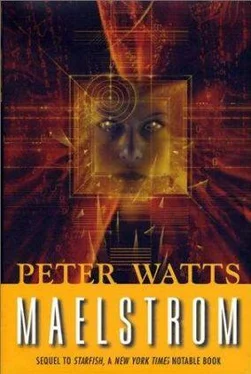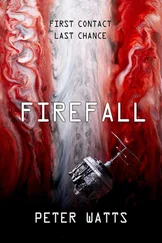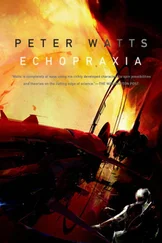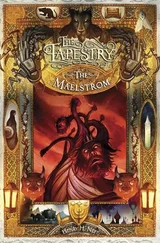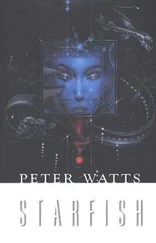According to GPS, that column had risen from the ocean directly above Channer Vent.
Desjardins squeezed each pixel until it bled. The gray beanstalk wouldn't tell him anything farther: it was just a pillar of cloud, fuzzy and undistinguished and three thousand kilometers from the camera.
There was this amorphous dot, though, off to one side. At first Desjardins attributed the lack of detail to atmospheric haze, but no: motion blur, the computer said. All along one axis, and easy enough to correct for.
The dot clarified. Still no details beyond an outline, but it looked like some kind of vehicle. A vague sense of familiarity itched in the back of his mind. He ran the silhouette through the standard commercial catalog and came up blank.
Damn , he thought, I know what that is. I know.
What is it?
He stared at the image for ten minutes. The he brought the catalog online again.
"Reset pattern resolution," he told it. "Disable vehicle recognition. Scan for vehicle components , standard catalog."
It took longer this time. The whole was a lot smaller than the sum of the parts. Processing winked coyly from the main display for a good two minutes before something more substantive took its place:
Brander, Mi/ke/cheal,
Caraco, Jud/y/ith
Clarke, Len/ie
Lubin, Ken/neth
Nakata, Alice
The names floated above the grainy enhance, brazenly nonsensical.
Desjardins recognized them, of course; a crew roster had popped onto his board the moment he'd homed in on Beebe Station . But he'd closed that window—and the names shouldn't be wriggling across the main display anyway.
Software glitch, probably. Stray photons, tunneling through some flawed bit of quantum insulation. It happened—all the time in Maelstrom, but occasionally even in pristine Haven. He muttered an oath and tapped on his board to clear it. Obligingly, the rogue text vanished.
But for the merest instant, something else flickered across the screen in its place. No baseline civilian would have even seen it. Desjardins caught a bit more: text strings, in English. A few words— angel, sockeye, vampire — jumped out at him, but most of it disappeared too fast to decompile even with his tweaked neurocircuitry.
Beebe was in there, though.
And when the standard catalog lit the screen with its findings a second later, Beebe moved to the very front of Desjardins's mind.
Commercial lifters could be distinguished by their great bladders of hard vacuum, buoyant toruses that held them up against the sky. There was no such silhouette on Desjardins's contact, which was why the catalog hadn't recognized it at first. No lifting bladder—not unless you counted a few ragged strips streaming from the trailing end of the silhouette. All that remained on that image was a shuttle 'scaphe, locked tight against the belly of a lifter's command module. Falling.
Each second, twelve thousand cubic meters of water smashed headlong through a bottleneck thirty-five meters wide. They hadn't called it Hell's Gate for nothing.
Generations had come to this place and gaped. Cable-cars had swung precariously across the canyon, fed raging whitewater vistas to thrillseeking tourists. Utilities had wept over all those wasted megawatts, billions of Joules pouring uselessly toward the ocean, unharnessable. So near and yet so far.
Then the world had begun wobbling. It had listed to one side, then another; the machinery that kept it upright seemed to get hungrier with each passing day. The Fraser was dammed a dozen times over to feed that appetite. Hell's Gate had held out the longest: untouchable at first, then merely prohibitive. Then almost economical.
Finally, imperative.
The Big One had slipped through the mountains like a guerilla, shattering here, merely tapping there in gentle reminder. It had crept past Hope and Yale without so much as a broken window. Hell's Gate was a good two hundred klicks upstream; there would have been reason to hope, if no time to.
A torrent of Precambrian rock had destroyed the dam and replaced it at the same time; the Fraser had exploded through the breach only to slam into an impromptu wall of collapsed granite half a kilometer downstream. The impoundment had not emptied but lengthened , north-south; the broken dam now cut across its midpoint, torn free at the western wall, still fastened at the east.
The TransCanada Highway was miraculously etched halfway up the east canyon wall, a four-lane discontinuity in a sheer ascent. At the point where dam met mountain, where highway met both, a barrier had been dropped from the sky to block the road. Botflies floated above it, and above the arched gray scar of the spillway.
Overnight, the Strip had moved east. This was its new border. Robert Boyczuk was supposed to keep it from moving any farther.
He contemplated Bridson across the chopper's interior. Bridson, her upper face cowled in her headset, didn't notice; she'd been lost in some virtual pastime for over an hour. Boyczuk couldn't blame her. They'd been here for almost two weeks and nobody'd tried to break quarantine except a couple of black bears. A number of vehicles had made it out this far in the few days following the Quake, but the barrier—plastered with quarantine directives and N'AmPac bylaws—had stopped most of them. A warning shot from the botflies had discouraged the others. There'd been no need to show off the pacification 'copter lurking behind the wall. Bridson had slept through most of it.
Boyczuk took his duties a bit more seriously. There was a definite need for segregation, nobody questioned that. Everything from Nipah to Hydrilla would sneak past the borders given half a chance, even at the best of times; now, with half the coast gone and the other half fighting off the usual gamut of rot-bugs, the last thing anyone needed was all that chaos spreading farther inland.
Inland had its own problems. There were more than enough borders to go around no matter which way you looked. Sometimes it seemed as if an invisible spiderweb was spreading across the world, some creeping fractured network carving the whole planet into splinters. Boyczuk's job was to sit on one of those edges and keep anything from crossing over until the state of emergency had passed. Assuming it did, of course; some places down in South America—even in N'Am, for that matter—had been under 'temporary quarantine' for eight or nine years.
Mostly people just put up with it. Boyczuk's job was an easy one.
"Hey," Bridson said. "Check this out."
She rerouted her headset feed to an inboard screen. Not a VR game after all. She'd been riding the botflies.
On the screen, a woman crouched on cracked asphalt. Boyczuk checked the location: a couple hundred of meters down the highway, hidden from the blockade behind the curve of the western precipice. One of the 'flies out over the dam had caught her around the corner.
Backpack. Loose-fitting clothes, hiker's clothes. Upper part of the face covered by an eyephone visor. Black gloves, short black hair—no, a black hood of some kind, maybe part of the visor. As a fashion statement, it didn't work. In Boyczuk's humble opinion, of course.
"What's she doing?" Boyczuk asked. "How'd she even get here?" No sign of a vehicle, although one could have been parked farther down the road.
"No," Bridson said. "She's not serious ."
The woman had braced herself in a sprinter's crouch.
"That's really bad form," Bridson remarked. "She could sprain an ankle."
Like a stone from a slingshot, the intruder launched herself forward.
* * *
"Oh, right ," Bridson said.
Читать дальше
